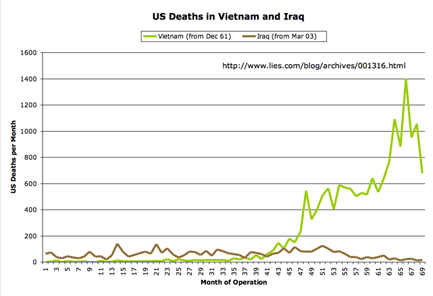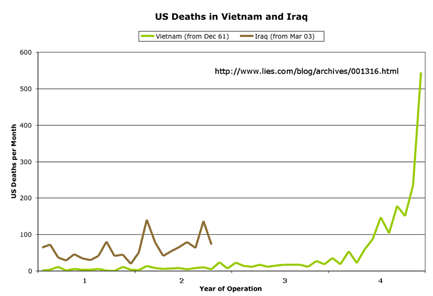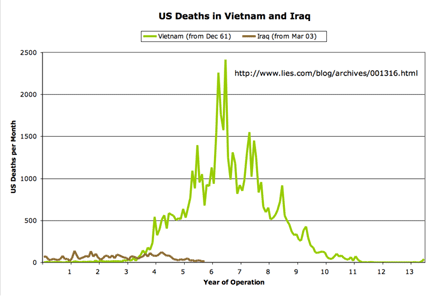Apparently the link I’d been using for Joshua Micah Marshall’s Talking Point Memo site was semi-broken, in that I was linking to www.talkingpointsmemo.com, which wasn’t updating with new material, rather than to plain old talkingpointsmemo.com, which was. Oops. (Update: Problem solved. The site changed IP addresses recently, and I had an old lookup cached in my browser for the ‘www’ version of the hostname. I restarted, and everything is great now. Funny: I never had that problem before I switched to OS X. Under Windows it was rare to go a day without crashing, or at least needing to restart my browser. But I’d been running the same instance of Camino for a week or so. Heh.)
The silver lining to this cloud is that last night I found a big batch of Marshall’s commentary that I’d previously missed, including lots on the outing of formerly covert CIA operative Valerie Plame.
One particularly interesting aspect of Marshall’s commentary is the interpretation he’s offered of presidential spokesperson Scott McClellan’s statements on the matter at the twice-daily White House press briefings. See Marshall’s comments here, here, and here.
Marshall notices that McClellan’s “denials” of involvement by key White House players are being delivered as if by parrot: the individuals in question (Karl Rove, Scooter Libby, and Elliot Abrams) were not involved in “leaking classified information.” The action is always referred to in that precise way; regardless of how the question is framed. The reporters keep asking for something clearer, and McClellan keeps answering-while-not-quite-answering, issuing the same “non-denial denial.” Lately it’s been getting pretty funny:
QUESTION: Scott, earlier this week you told us that neither Karl Rove, Elliot Abrams nor Lewis Libby disclosed any classified information with regard to the leak. I wondered if you could tell us more specifically whether any of them told any reporter that Valerie Plame worked for the CIA?
MCCLELLAN: Those individuals — I talked — I spoke with those individuals, as I pointed out, and those individuals assured me they were not involved in this. And that’s where it stands.
QUESTION: So none of them told any reporter that Valerie Plame worked for the CIA?
MCCLELLAN: They assured me that they were not involved in this.
QUESTION: Can I follow up on that?
QUESTION: They were not involved in what?
MCCLELLAN: The leaking of classified information.
Marshall speculates that this may mean that the White House has carved out what they think is a legally defensible position that the leaking of Plame’s name might not have constituted a leaking of “classified information.” By couching the denials in this precise way, they thereby preserve a legal refuge if/when it can be demonstrated that one or more of the Rove/Libby/Abrams trio actually did leak Plame’s name.
It seems to me that a less-sinister (or at least, a differently sinister) explanation would be that this is part of the White House’s ongoing effort to portray this as no big deal. Everyone in Washington leaks classified information from time to time. To the extent this act can be cast in those general terms, it helps make this into the non-story that Bush & Co. would obviously much prefer it to be. Donald Sensing does his part to push the administration line on this in response to a comment of mine on his weblog, where he describes this whole affair as quite typical.
But it’s not. It’s a big deal. It’s a big deal because it appears very likely that there was a coordinated effort on the part of the White House political operation to punish a whistle-blower by going after his wife, in the process significantly compromising CIA efforts to fight the proliferation of WMD. And what that reveals about the quality of the decision-making in this White House, about their sense of proportion, is really, really disturbing.
It adds one more item, and a big one, to the growing pile of evidence that the Bush administration is out of control. It’s the Mayberry Machiavellis, the kids on Big Wheels, running roughshod over anyone who gets in their way. It’s not about governing. It’s not about solving problems, fixing the economy, or protecting the American people from terrorism. It’s not about leading the world’s sole superpower in a responsible manner.
It’s only about one thing: getting your guy elected. And when you pursue that goal to the exclusion of everything else, you’re prone to disasterous screwups like this one. And guess what? The fact that they’re spinning as hard as they can to pretend it didn’t happen means nothing is going to change.



